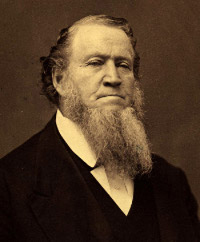The following is the foreword of the book, Revealed Educational Principles & The Public Schools.
Scott N. Bradley
(Dr. Scott N. Bradley is the Founder and Chairman of Constitution Commemoration Foundation, Inc., and twice candidate for the U.S. Senate in 2006 and 2010.)
Members of the Church of Jesus Christ of Latter-Day Saints are taught that:
Whatever principle of intelligence we attain unto in this life, it will rise with us in the resurrection. And if a person gains more knowledge and intelligence in this life through his diligence and obedience than another, he will have so much the advantage in the world to come.1
And by the power of the Holy Ghost it is possible to “know the truth of all things.”2 The admonition to seek and not limit knowledge of truth is found throughout the scriptures brought forth in the latter day. Examples are found in the following Book of Mormon scriptures:
Yea, wo be unto him that saith: we have received, and we need no more! (2 Nephi 28:27)
And now Alma began to expound these things unto him, saying: It is given unto many to know the mysteries of God: nevertheless they are laid under a strict command that they shall not impart only according to the portion of his word which he doth grant unto the children of men according to the heed and diligence which they give unto him.
And therefore he that will harden his heart the same receiveth the lesser portion of the word; and he that will not harden his heart, to him is given the greater portion of the word until it is given unto him to know the mysteries of God until he know them in full.
And now Alma began to expound these things unto him, saying: It is given unto many to know the mysteries of God; nevertheless they are laid under a strict command that they shall not impart only according to the portion of his word which he doth grant unto the children of men, according to the heed and diligence which they give unto him.
And therefore, he that will harden his heart, the same receiveth the lesser portion of the word; and he that will not harden his heart, to him is given the greater portion of the word, until it is given unto him to know the mysteries of God until he know them in full.
And they that will harden their hearts, to them is given the lesser portion of the word until they know nothing concerning his mysteries; and then they are taken captive by the devil, and led by his will down to destruction. Now this is what is meant by the chains of hell.
To know them in and they that will harden his heart, to them is given the lesser portion of the word until they know nothing concerning his mysteries; and then they are taken captive by the devil, and led by his will down to destruction. Now this what is meant by the chains of hell. (Alma 12:9-11)
Indeed, it may be said that the great prophets attained a fullness of their calling by opening their mind to the expansive revelatory knowledge that God’s infinite wisdom was willing to bestow upon one who seeks appropriately. The opening verses of the Book of Mormon suggest approval of one making such a quest, as does the opening of Abraham’s record:
I, Nephi, having been born of goodly parents, therefore I was taught somewhat in all the learning of my father ;and having seen many afflictions in the course of my days, nevertheless ,having been highly favored of the lord in all my days ; yea having had a great knowledge of the goodness and the mysteries of God ,therefore I make a record of my proceedings in my days. [1 Nephi 1:1)And it came to pass that I Nephi, being exceedingly young nevertheless being large in stature, and also having great desires to know of the mysteries of God, wherefore, I did cry unto the Lord; and behold he did visit me, and did soften my heart that I did believe all the word which had been spoken by my father; wherefore, I did not rebel against him like unto my brothers. (Nephi 2:1)
For he that diligently seeketh shall find; and the mysteries shall he unfolded by the power of the Holy Ghost, as well in these times as is times of old, as in times to came ; wherefore, the course of the Lord is one eternal round. (1 Nephi 10:19)
And finding there was greater happiness and peace and rest for me, I sought for the blessings of the fathers, and the right where-unto I should be ordained to administer the same; having been myself a follower of righteousness,desiring also to be one who possessed great knowledge, and to be a greater follower of righteousness, and to possess a greater knowledge, and to be a father of many nations, a prince of peace, and desiring to receive instructions, and to keep the commandments of god, I became a rightful heir, a high Priest, holding the right belong to the father. (Abraham 1:2)
 And there are examples to be found such as Enoch, the Brother of Jared, and Moses who by faithful seeking, received magnificent theophanies that were all encompassing and expansive as this worlds entire existence.
And there are examples to be found such as Enoch, the Brother of Jared, and Moses who by faithful seeking, received magnificent theophanies that were all encompassing and expansive as this worlds entire existence.
But are these great understandings limited to the few chosen to act as prophet-leaders before the followers of Christ, or are they offered more widely? The scriptures aver, as does the Prophet of the Restoration, that these manifestations are graciously offered to all who will humble themselves and diligently seek them:
Yea he that repenteth and exercise the faith, and bringeth forth good works, and prayeth continually without ceasing–unto such it is given to know the mysteries of God; yea, unto such it shall be given to reveal things which never have been revealed; yea, and it shall be given unto such to bring thousands of souls to repentance, even as it has been given unto us to bring these our brethren to repentance.3
God hath not revealed anything to Joseph, but what he will make known unto the twelve, and even the least saint may know all things as fast as he is able to bear them.4
In spite of these magnificent promises, Brigham Young worried that the Saints would become so complacent and trusting that they would fail to exercise their divine investiture of personal revelation and that they would not diligently seek their own personal guidance in matters of great importance:
You may know whether you are led right or wrong, as well as you know the way home; for every principle God has revealed carries its own. What a pity it would be if we were led by one man to utter destruction! Are you afraid of this? I am more afraid that this people have so much confidence in their leaders that they will not inquire of themselves of God whether they are led by Him. I am fearful they settle down in a state of blind self-security, trusting their eternal destiny in the hands of their leaders with a reckless confidence that in itself would thwart the purposes of God in their salvation, and weaken that influence they could give to their leaders did they know for themselves, by the revelations of Jesus, that they are led in the right way. Let every man and woman know, by the whispering of the Spirit of God to themselves, whether their leaders are walking in the path that the Lord dictates, or not. This has been my exhortation continually.5
 The circumstances President Young warned against had been the experience of Moses as he had sought to prepare the Children of Israel to come into the presence of God and be led by Him, but they refused, saying to Moses: “Speak thou with us, and we will hear: but let not God speak with us, lest we die”.6 Thus, anciently, the Children of Israel were relegated to living under a lesser law adapted to a lower spiritual capacity, rather than the fullness of the Gospel and all of its associated magnificent blessings.
The circumstances President Young warned against had been the experience of Moses as he had sought to prepare the Children of Israel to come into the presence of God and be led by Him, but they refused, saying to Moses: “Speak thou with us, and we will hear: but let not God speak with us, lest we die”.6 Thus, anciently, the Children of Israel were relegated to living under a lesser law adapted to a lower spiritual capacity, rather than the fullness of the Gospel and all of its associated magnificent blessings.
From the beginning of this dispensation until early in the 20th Century the Lord’s chosen leaders pled with the Church membership to seek light, knowledge, and truth through the path of divinely inspired education. In this book, Jack Monnett painstakingly and systematically documents the sad commentary associated with latter-day Israel as the body of the Church abandoned that sound prophetic counsel. Tragically, in a manner similar to ancient Israel’s abandonment of Jehovah as their king in favor or of an earthly king in an effort to be like other nations (see I Samuel chapter 8). modern Israel turned her back on a divine plan of education in favor of an education offered in the manner of the world. We are taught that the Book of Mormon was written for our day.8 Then. in the very next chapter of Mosiah. they gave us vivid instruction regarding the dangers of teachers who taught a secular godless religion and ignored the greater truths of eternity-: And he appointed teachers of the brethren of Amulon in new land which was possessed by his people:
And thus the language of Nephi began to be taught among all the people of the Lamanites. And they were a people friendly one with another: nevertheless they knew not God: neither did the brethren of Amulon teach them anything concerning the Lord their God neither the law of Moses: nor did they teach them the words of Abinadi: But they taught them that they should keep their record. and that they might write one to another. And thus the Lamanites began to increase in riches. and began to trade one with another and war great. And began to be a cunning and a wise people. as to the wisdom of the woery cunning people. delighting in all manner of wickedness and plunder. except it were among their own brethren.
And the ancient American prophets warned us of the pitfalls and characteristics of a religion devoid of the divine, which worshiped the learning and wisdom of man when they presented Nehors doctrines of priestcraft in Alma chapter 1, and the archetypical Secular Humanist philosophies of Korihor in Alma chapter 30.
Nephi thought it so important that we of the latter days clearly understood “priestcraft that he (and Mormon) included a definition of the term in his record:
He commandeth that there shall be no priestcrafts; for the behold, priestcrafts are that men preach and set themselves up .for a table light unto the world, that they may get gain and praise of the world; but they seek not the welfare of Zion.
Behold. the Lord hath forbidden this thing .. 9
Under this definition the warning may be more broadly applied ht a than how most in the LDS faith currently understand it! Few know that the term “priestcrafts” was a term in common usage among the American Founding Fathers by which they identified individuals that in taught for their own aggrandizement and in pursuit of an agenda not beneficial to mankind, in spite of their purported purposes. Recall that Per- the Nephite record warns us that “priestcrafts”, if enforced among the ach people, would prove their destruction:
But Alma said unto him: Behold, this is the first time that priestcraft has been introduced among this people. And behold, thou art not only guilty of priestcraft, but bast endeavored to enforce it by the sword; and were priestcraft to be enforced among this people it would prove their entire destruction.10
 Of course, everything done by government involves force: taxation, regulation, compulsory requirements, etc. Thus, regardless of the guise under which it is fostered, if carried out for the purposes defined by Nephi (and by the American Founders) “priestcrafts” must needs be carefully guarded against. One need not suppose that it is proposed that all government actions fall under the term “priestcraft,” but wisdom would dictate that great vigilance must be exercised to assure that no government action be allowed to creep into that realm. That is one of the reasons that the Founding Fathers were so careful to prevent the establishment of tax-supported religion because it would allow the exercise of the power of government to force the promotion of a belief over the beliefs of others. It should be of interest that the Humanist belief system (some would go so far as to claim it is a religion based upon a worship of the learning and wisdom of man, and which denies the existence of a divine god) has become the defacto tax-supported religion of the nation in all matters public, including the public school system. Wisdom recommends the careful reading of the Humanist belief system, and the extent and magnitude to which those philosophies are promoted within the lesson plans of the public school system. And Moroni warned us against and foreshadowed the shifting standards of the Humanist-promoted “situational ethics” and godlessness found in the modern classroom, which is devoid of God and in denial of the divinity of Christ when he plainly explained the simple process by which discerning saints could determine if a doctrine or a system was of God or not:
Of course, everything done by government involves force: taxation, regulation, compulsory requirements, etc. Thus, regardless of the guise under which it is fostered, if carried out for the purposes defined by Nephi (and by the American Founders) “priestcrafts” must needs be carefully guarded against. One need not suppose that it is proposed that all government actions fall under the term “priestcraft,” but wisdom would dictate that great vigilance must be exercised to assure that no government action be allowed to creep into that realm. That is one of the reasons that the Founding Fathers were so careful to prevent the establishment of tax-supported religion because it would allow the exercise of the power of government to force the promotion of a belief over the beliefs of others. It should be of interest that the Humanist belief system (some would go so far as to claim it is a religion based upon a worship of the learning and wisdom of man, and which denies the existence of a divine god) has become the defacto tax-supported religion of the nation in all matters public, including the public school system. Wisdom recommends the careful reading of the Humanist belief system, and the extent and magnitude to which those philosophies are promoted within the lesson plans of the public school system. And Moroni warned us against and foreshadowed the shifting standards of the Humanist-promoted “situational ethics” and godlessness found in the modern classroom, which is devoid of God and in denial of the divinity of Christ when he plainly explained the simple process by which discerning saints could determine if a doctrine or a system was of God or not:
But behold, that which is of God inviteth and enticeth to do good continually; wherefore, every thing which inviteth and enticeth to do good, and to love God, and to serve him, is inspired of God.
Wherefore, take heed, my beloved brethren, that ye do not judge that which is evil to be of God, or that which is good and of God to be of the devil.
For behold, my brethren, it is given unto you to judge, that ye may know good from evil; and the way to judge is as plain, that ye may know with a perfect knowledge, as the daylight is from the dark night.
For behold, the Spirit of Christ is given to every man, that he may know good from evil; wherefore, I show unto you the way to judge; for every thing which inviteth to do good, and to persuade to believe in Christ, is sent forth by the power and gift of Christ; wherefore ye may know with a perfect knowledge it is of God.
But whatsoever thing persuaded men to do evil, and believe not in Christ, and deny him, and serve not God, then ye may know with a perfect knowledge it is of the devil; for after this manner doth the devil work, for he persuaded no man to do good, no, not one; neither do his angels; neither do they who subject themselves unto him.
And now, my brethren, seeing that ye know the light by which ye may judge, which light is the light of Christ, see that ye do not judge wrongfully; for with that same judgment which ye judge ye shall also be judged. 11
Other wise men not of the LDS faith have warned of the inherent dangers associated with the American public education system. Princeton theologian Dr. A. A. Hodge astutely observed more than a century ago:
 It is capable of exact demonstration that if every party in the State has the right of excluding from public schools whatever he does not believe to he true. then he that believes most must give way to him that believes least. and then he that believes least must give way to that believes absolutely nothing, no matter in how small a minority the atheists or agnostics may be. It is self-evident that On this scheme, if it is consistently and persistently carried out in all parts of the country. the United States system of national popular education will he the most efficient and widespread instrument for the propagation of atheism which the world has ever seen.12 Tragically, in spite of the plain and simple warnings of the Book of Mormon and the pleading importuning of Joseph Smith, Brigham Young, John Taylor, and others the Saints sustained as prophets, seers, and revelators, the Latter-day Saints have raced headlong into the grip of a worldly educational system that fulfills the dream of Karl Marx as documented in the Tenth Plank of the Communist Manifesto and is embodied in the Humanist Manifestos of the 20th and 21 centuries. And it would appear that, just as the ancient prophet Samuel never again spoke against kings once the Children of Israel chose an earthly king over their Heavenly King, modern prophets have accommodated their counsel to the wishes of Modern Israel regarding their education system. But there is yet a magnificent hope! Individuals, families, congregations, and (hopefully) communities may yet reverse the sad course Monnett exposes in this book. The promises made by God are not withdrawn from those who seek with all their hearts to abide by the principles upon which the promised blessings may be obtained:
It is capable of exact demonstration that if every party in the State has the right of excluding from public schools whatever he does not believe to he true. then he that believes most must give way to him that believes least. and then he that believes least must give way to that believes absolutely nothing, no matter in how small a minority the atheists or agnostics may be. It is self-evident that On this scheme, if it is consistently and persistently carried out in all parts of the country. the United States system of national popular education will he the most efficient and widespread instrument for the propagation of atheism which the world has ever seen.12 Tragically, in spite of the plain and simple warnings of the Book of Mormon and the pleading importuning of Joseph Smith, Brigham Young, John Taylor, and others the Saints sustained as prophets, seers, and revelators, the Latter-day Saints have raced headlong into the grip of a worldly educational system that fulfills the dream of Karl Marx as documented in the Tenth Plank of the Communist Manifesto and is embodied in the Humanist Manifestos of the 20th and 21 centuries. And it would appear that, just as the ancient prophet Samuel never again spoke against kings once the Children of Israel chose an earthly king over their Heavenly King, modern prophets have accommodated their counsel to the wishes of Modern Israel regarding their education system. But there is yet a magnificent hope! Individuals, families, congregations, and (hopefully) communities may yet reverse the sad course Monnett exposes in this book. The promises made by God are not withdrawn from those who seek with all their hearts to abide by the principles upon which the promised blessings may be obtained:
There is a law, irrevocably decreed in heaven before the foundations of this world, upon which all blessings are predicated—And when we obtain any blessing from God, it is by obedience to that law upon which it is’ predicated.”ref]14 Doctrine & Covenants 130:20-21[/note] Those who so desire may obtain the fullness of knowledge promised to righteous seekers of truth by turning from the worldly educational systems and diligently pursuing the further light and knowledge God has promised by applying His divine formula. In speaking of the comprehensive nature of the marvelous manifestations associated with the Holy Ghost, and the holistic effects of the ministrations of the Holy Ghost upon a properly prepared soul who is seeking the fullness which may come upon such a seeker, Elder Parley P. Pratt wrote:
The immersion in water, in the name of the Father, Son, and Holy Spirit, for remission of sins; and the baptism of the Holy Spirit, which follows according to promise, by the laying on of hands of the holy Priesthood,. were instituted from before the foundation of the World, as a pattern of the birth, death, resurrection and new life of man. The candidate is now initiated into the first principles of the science of Divine Theology. His mind is quickened, his intellectual faculties are aroused to intense activity. He is, as it were, illuminated. He learns more of divine truth in a few days, than he could have learned in a lifetime in the best merely human institutions in the World His affections are also purified, exalted, and increased in proportion.
He loves his heavenly Father, and Jesus Christ, with a perfect love. I le also loves the members of the Church, or the body of Christ, as he loves his own soul; while his bosom swells with the tenderest sympathies, and emotions of good will and benevolence, for all mankind. He would make any ,sacrifice which might he expedient, to do good. He would lay down his’ life most cheerfully, without one moment’s’ hesitation or regret, if required of him by the cause of truth.
He also feels the spirit of prayer and watchfulness continually, and pours out his soul in the same, and finds he is answered in all things which are expedient. He is now in a fit capacity to exercise some one or more of the spiritual gifts. He may perhaps veal( in power, in the word of wisdom, in the word of knowledge, in prophecy, or in other tongues. He may see a vision, dream an inspired dream, or possess the gift to be healed, or to heal others, by the laying on of hands in the name of Jesus Christ.
An intelligent being, in the image of God, possesses every organ, attribute, sense, sympathy, affection, of will, wisdom, love, power and gift, which is possessed by God himself. But these are possessed by man, in his rudimental state, in a subordinate sense of the word. Or, in other words, these attributes are in embryo; and are to be gradually developed. They resemble a bud—a germ, which gradually develops into bloom, and then, by progress, produces the mature fruit, after its own kind. The gift of the Holy Spirit adapts itself to all these organs or attributes. It quickens all the intellectual faculties, increases. enlarges, expands and purifies all the natural passions and affections; and adapts them, hr the gift of wisdom, to their land use. It inspires, develops, cultivates and matures all the .fine-toned sympa inspires virtue, kindness, cif our nature. It this, joys, tastes, kindred feelings and actions goodness, tenderness, gentleness and charity. It develops beauty of person, form and features. It tends to health, vigor, animation and social feeling. It develops and invigorates all the .faculties of the physical and intellectual man. It strengthens, invigorates, and gives tone to the nerves. In short, it is, as it were, marrow to the hone, joy to the heart, light to the eyes, music to the ears, and lift to the whole being.”13
It would seem that the time has arrived for all devoted Saints to “receive the Holy Ghost” as was pronounced upon them when they were confirmed a member of Christ’s Church! Indeed, with such an infusing, we may begin to see again among the Saints the marvelous manifestations of wisdom, faith, courage, devotion to all that is virtuous, lovely, of good report and praiseworthy, and even the vigor, strength and longevity that characterized the early patriarchs. And as the saints come to seek and yearn for Zion, it would seem that the “oneness” spoken of will naturally come as the Holy Ghost becomes more fully active in our lives:
And the Lord called his people ZION, because they were of one heart and one mind, and dwelt in righteousness; and there was no poor among them.’14 Therefore, verily, thus saiih the Lord, let Zion rejoice, for this is Zion—THE PURE IN HEART; therefore, let Zion rejoice, while all the wicked shall mourn.”15
When we consider the divinely inspired promises made to the fathers in regards to all things, including education, we must consider and apply the wise counsel of Elijah: “How long halt ye between opinions? if the LORD [be] God, follow him; but if Baal, [then] follow him.” 16
We are told that “this life is the time for men to prepare to meet God.” 17 The blandishments of the world pale in comparison to the visions and reality of the promises of eternal life and exaltation as we should understand them. How could our heads be turned from these things so easily? Why stand we here idle while there are worlds without number promised? 18 Much is at stake for each soul, and the eternities hang in the balance. What think ye?
Dr. Scott N. Bradley
December, 2013
- 1 D&C 130:18-19
- 2 Moroni 10:5
- 3 Alma 26:22
- 4 Joseph F. Smith, ed., Teachings of the Prophet Joseph Smith. Salt Lake City: Deseret Book Company. 1972. p. 149.
- 5 Journal of Discourses 9:149-150.
- 6 Exodus 20:19
- 7 see especially Ezra Taft Benson, Ensign, November, 1986, pp. 4-7.
The ancient prophets of America saw our day and included the specific wisdom suited to guide us through the challenges of the modern world. Interestingly, they counseled us regarding acceptable teachers: “And also trust no one to be your teacher nor your minister. except he be a man of God. walking in his ways and keeping his commandments.“78 Mosiah 23:14
- 2 Nephi 26:29-30
- 11 Alma 1:12
- 12 Moroni 7:13-18
- 13 Archibald Alexander Hodge, Lectures on Theological Themes. 1887. Philadelphia: Presbyterian Board of Publication
- 15 Parley P. Pratt, Key to Science of Theology. 1891. Salt Lake City: George Q. Cannon & Sons. pp. 95-102
- 16 Moses 7:18
- 17 Doctrine & Covenants 97:21
- 18 1 Kings 18:21
- 19 Alma 34:32
- 20 Doctrine & COvenants 84:33-39








